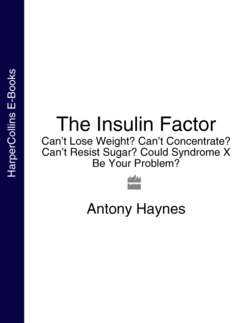Читать книгу The Insulin Factor: Can’t Lose Weight? Can’t Concentrate? Can’t Resist Sugar? Could Syndrome X Be Your Problem? - Antony Haynes - Страница 36
Interpreting the questionnaire
ОглавлениеA high score in this questionnaire means you consume too many refined carbohydrates and this contributes to and increases your risk of Insulin Resistance. As you make changes to your diet, you should see your score reduce. Reading this chapter will help you understand why the wrong carbs are the major cause of Insulin Resistance.
| 0–5 | Excellent! Keep your carb balance at this level. If you scored 5 or just under, see if you can score even lower by following the Insulin Factor Plan. |
| 6–10 | This suggests you have a blood sugar problem, which is caused by your diet. To resolve this as swiftly as possible you should to follow the Insulin Factor Diet Plan and the Insulin Resistance Supplement Plan One. |
| 11–15 | Too much! This strongly indicates a blood sugar and insulin problem, and that your diet is the major culprit. You need to follow the Insulin Factor Diet Plan and the Insulin Resistance Supplement Plan that your Insulin Resistance Questionnaire indicated in chapter 3. You should also redo this questionnaire in four weeks’ time to check your progress. |
| 16+ | Much too much! There’s no doubt that your diet is a significant causative factor in your Insulin Resistance. You may benefit from doing the Insulin Resistance Blood Test. You need to follow the Insulin Factor Diet Plan and the Insulin Resistance Supplement Plan that your Insulin Resistance Questionnaire indicated in chapter 3. You also need to consider testing and balancing your adrenal hormones (see chapter 9). Use the questionnaires to monitor your progress. After four or five weeks, if there is no marked improvement despite changing your diet you should see a qualified nutritionist (see Resources). |
